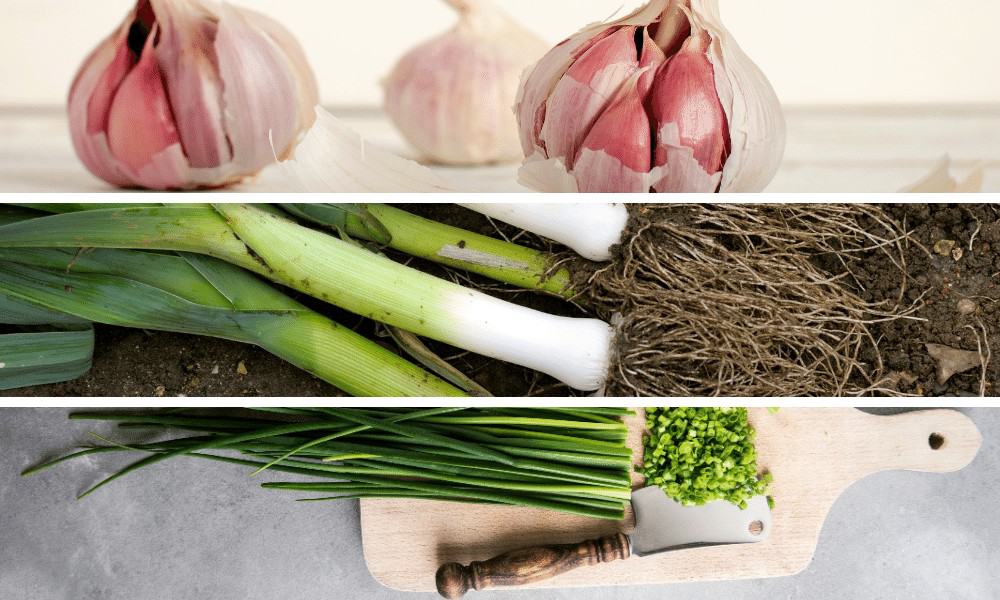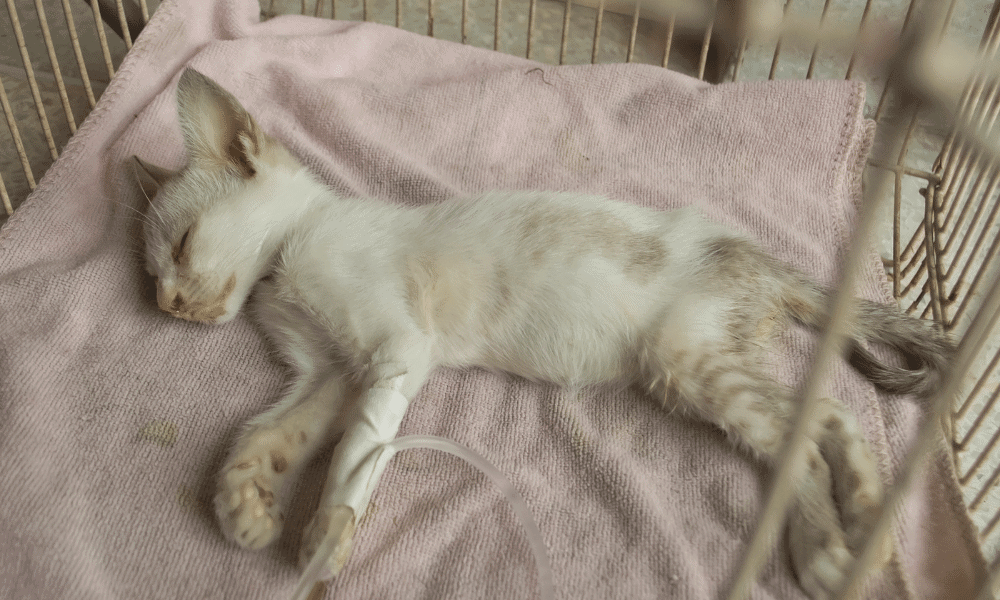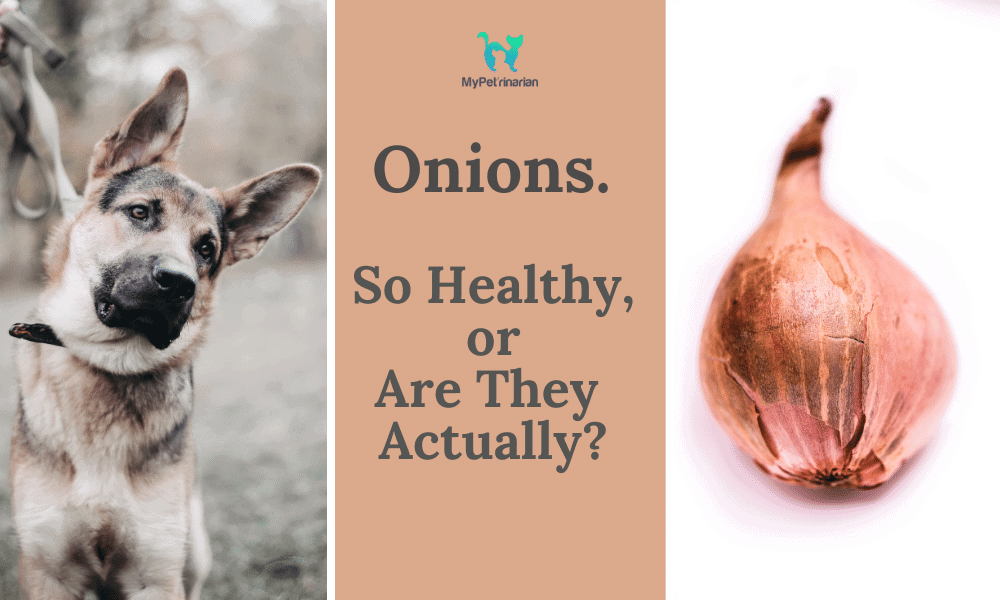There are multiple different types of foods that are poisonous, so maybe you have already asked yourself a question: “Can dogs eat onions?”. The simplest answer is, avoid it as much as possible. Onions are toxic to dogs and have a negative effect on dog’s red blood cells.
Onions and the whole allium family are an inevitable part of many people’s cuisine. These commodities are used in many recipes. They simply create an extra flavour in our meals. The “members” of the allium family have their own very specific taste. And that’s exactly what we like.
Don’t Let Your Dog Eat Onions or Products Containing It
Once you make tasty food that smells so good and that fills out the whole house, be careful that your dog does not take a bite of it. As we stated in the previous article, dogs are very curious creatures, so watch out – dogs eat literally everything, and once they get into food they don’t tend to stop after eating just a small amount. Unfortunately, human foods may be poisonous to our furry friends. Onions are definitely on the list of toxic foods.

Why Onions Are Toxic to Dogs
All types of onions are toxic to dogs. Onions contain N-propyl disulfide. This particular principle breaks down red blood cells. Its negative effect is Hemolytic anemia (aka Heinz body anemia) which cause is a reduced number of circulating red blood cells, hemoglobin, or both.
It Is NOT Only The Raw Onion That Is Toxic
You may think that onions themselves are not that appealing to the dog’s taste palate and most probably you haven’t really heard a story where a dog has eaten onions. However, onion rings or any other more appealing versions can catch the dog’s attention.
Furthermore, be especially aware of onion powder or dried forms of onions in general. Onion powder has an even higher level of toxicity than other onion related foods.
Mentioning that, any form of onion (fried, powdered or cooked) is also very toxic. In addition, shallots, garlic, leeks and chives that are a part of the, aforementioned, allium family are dangerous as well.

Now, We Can Talk About Onion Poisoning
Dogs “come” in many breeds and sizes and the size of dog matters. What can be a non-toxic amount for a Great Dane may be fatal for a Chihuahua. To be more specific, 100 g of onion (medium-sized onion) per 20kg of body weight can make a dog sick.
Onion poisoning can be caused by:
* Eating small amounts of onions regularly
- If you for example share your breakfast containing onion with your dog
- The toxins in onions can accumulate in a dog’s body meaning that what may not be problematic in the beginning, can have serious consequences in the long run
* Eating a large amount at once
- It is not like dogs are very attracted to regular, raw onions. However, as mentioned above, any form of onion can be poisonous.
Symptoms of Onion Toxicity
There are multiple different clinical signs that can tell you if your dog had been intoxicated. These signs can appear within one day if the ingested amount of onions was big. Otherwise, it can take several days.
Clinical signs include:
- Lethargy
- Weakness
- Decreased appetite
- Elevated heart rate
- Pale gums
- Urine colored to red

However, be aware that in case your dog doesn’t get the required treatment and the toxic levels are high it can lead to kidney failure and potential death.
What You Should Do After Your Dog Ate Onions
In case your dog shows signs of any of the above-mentioned symptoms, get your dog to a vet as promptly as possible. We don’t recommend to postpone your visit to the vet. As stated above, toxicity in dogs may take some time to appear. This means that your pet has had the toxins in its body for quite some time.

Diagnosis and Further Treatment
Based on the symptoms of onion toxicity and your dog’s blood test results, the vet can diagnose the dog with this specific type of poisoning. After diagnosing it, the veterinarian may induce vomiting (if onion/s were eaten recently) and will provide supportive care. It will be given until the dog is able to produce healthy red blood cells to replace the ones that had been damaged. Activated charcoal is another remedy that can be used.
Unfortunately, the dog is not always in such a shape where it can produce healthy red blood cells. In those instances, the veterinarian will need to do blood transfusion.

Onion poisoning can have fatal consequences. Therefore, you should be fast in contacting your veterinarian and make sure to keep onions and onion products stored in a safe place away from your dog’s reach.
How Do I Prevent This From Happening?
As simple as it sounds, do not let your dog anywhere near onions, garlic, leeks, chives or any other commodity that may be harmful to your precious pet. It might sound easy, but you would be surprised how many products actually contain any of these allium family members.
Be More Attentive to What You Feed Your Dog
Don’t even give your dog an opportunity to lick the plate after you are done eating unless you are sure there were none of the aforementioned commodities included. And they are, for example, a part of various types of sauce, spices and broths. So even if you and your dog love this activity, it’s better to stop it for your pet’s health’s sake.

Can Other Animals Suffer From Onion Toxicity?
It is not only dogs that shouldn’t eat onions. For example, cats and rabbits may also suffer acutely. As in the case of dogs, onions and their toxins cause anemia which, as mentioned previously, prompts a decline in red blood cell count.

Our pets tend to be hesitant about eating onions, however, in case there is nothing else to eat, they may give it a try. Therefore, be sure you don’t leave onions or related food lying around within your pet’s reach.
Treatment For Cats And Rabbits
So far there is no antidote, and thus, supportive care ought to be provided. Cats, rabbits and other pets may be provided with intravenous fluid therapy. The fluids help to reduce the number of toxins in the blood. This helps the body to cope with the toxicity more effectively.

In Summary
So the answer to the question: “Can dogs eat onions?” What about cats? rabbits? The answer is a resounding NO! Onion toxicity may not appear immediately, but it is toxic to dogs. Now you, hopefully, know more about, for example, N propyl disulfide – the ingredient that has a negative effect on a dog’s red blood cells, the symptoms and possible treatment. Remember, human food shouldn’t be fed to pets!

